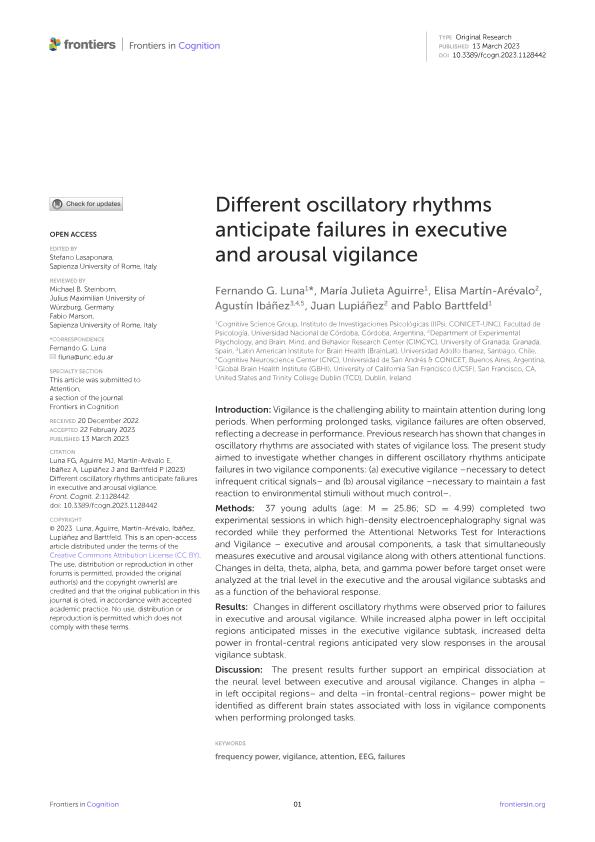Mostrar el registro sencillo del ítem
dc.contributor.author
Luna, Fernando Gabriel

dc.contributor.author
Aguirre, María Julieta

dc.contributor.author
Martín Arévalo, Elisa
dc.contributor.author
Ibañez, Agustin Mariano

dc.contributor.author
Lupiáñez, Juan
dc.contributor.author
Barttfeld, Pablo

dc.date.available
2023-09-20T15:30:45Z
dc.date.issued
2023-03
dc.identifier.citation
Luna, Fernando Gabriel; Aguirre, María Julieta; Martín Arévalo, Elisa; Ibañez, Agustin Mariano; Lupiáñez, Juan; et al.; Different oscillatory rhythms anticipate failures in executive and arousal vigilance; Frontiers Media; Frontiers in Cognition; 2; 3-2023; 1-15
dc.identifier.issn
2813-4532
dc.identifier.uri
http://hdl.handle.net/11336/212315
dc.description.abstract
Introduction: Vigilance is the challenging ability to maintain attention during long periods. When performing prolonged tasks, vigilance failures are often observed, reflecting a decrease in performance. Previous research has shown that changes in oscillatory rhythms are associated with states of vigilance loss. The present study aimed to investigate whether changes in dierent oscillatory rhythms anticipate failures in two vigilance components: (a) executive vigilance –necessary to detect infrequent critical signals– and (b) arousal vigilance –necessary to maintain a fast reaction to environmental stimuli without much control–. Methods: 37 young adults (age: M = 25.86; SD = 4.99) completed two experimental sessions in which high-density electroencephalography signal was recorded while they performed the Attentional Networks Test for Interactions and Vigilance – executive and arousal components, a task that simultaneously measures executive and arousal vigilance along with others attentional functions. Changes in delta, theta, alpha, beta, and gamma power before target onset were analyzed at the trial level in the executive and the arousal vigilance subtasks and as a function of the behavioral response. Results: Changes in dierent oscillatory rhythms were observed prior to failures in executive and arousal vigilance. While increased alpha power in left occipital regions anticipated misses in the executive vigilance subtask, increased delta power in frontal-central regions anticipated very slow responses in the arousal vigilance subtask. Discussion: The present results further support an empirical dissociation at the neural level between executive and arousal vigilance. Changes in alpha – in left occipital regions– and delta –in frontal-central regions– power might be identified as dierent brain states associated with loss in vigilance components when performing prolonged.
dc.format
application/pdf
dc.language.iso
eng
dc.publisher
Frontiers Media

dc.rights
info:eu-repo/semantics/openAccess
dc.rights.uri
https://creativecommons.org/licenses/by-nc-sa/2.5/ar/
dc.subject
FREQUENCY POWER
dc.subject
VIGILANCE
dc.subject
ATTENTION
dc.subject
EEG
dc.subject
FAILURES
dc.subject.classification
Otras Psicología

dc.subject.classification
Psicología

dc.subject.classification
CIENCIAS SOCIALES

dc.title
Different oscillatory rhythms anticipate failures in executive and arousal vigilance
dc.type
info:eu-repo/semantics/article
dc.type
info:ar-repo/semantics/artículo
dc.type
info:eu-repo/semantics/publishedVersion
dc.date.updated
2023-09-15T11:08:09Z
dc.journal.volume
2
dc.journal.pagination
1-15
dc.journal.pais
Suiza

dc.description.fil
Fil: Luna, Fernando Gabriel. Universidad Nacional de Córdoba. Instituto de Investigaciones Psicológicas. - Consejo Nacional de Investigaciones Científicas y Técnicas. Centro Científico Tecnológico Conicet - Córdoba. Instituto de Investigaciones Psicológicas; Argentina
dc.description.fil
Fil: Aguirre, María Julieta. Universidad Nacional de Córdoba. Instituto de Investigaciones Psicológicas. - Consejo Nacional de Investigaciones Científicas y Técnicas. Centro Científico Tecnológico Conicet - Córdoba. Instituto de Investigaciones Psicológicas; Argentina
dc.description.fil
Fil: Martín Arévalo, Elisa. Universidad de Granada. Centro de Investigación Mente, Cerebro y Comportamiento.; España
dc.description.fil
Fil: Ibañez, Agustin Mariano. Universidad Adolfo Ibañez; Chile. Universidad de San Andrés; Argentina. Consejo Nacional de Investigaciones Científicas y Técnicas; Argentina
dc.description.fil
Fil: Lupiáñez, Juan. Universidad de Granada. Centro de Investigación Mente, Cerebro y Comportamiento.; España
dc.description.fil
Fil: Barttfeld, Pablo. Universidad Nacional de Córdoba. Instituto de Investigaciones Psicológicas. - Consejo Nacional de Investigaciones Científicas y Técnicas. Centro Científico Tecnológico Conicet - Córdoba. Instituto de Investigaciones Psicológicas; Argentina
dc.journal.title
Frontiers in Cognition
dc.relation.alternativeid
info:eu-repo/semantics/altIdentifier/url/https://www.frontiersin.org/articles/10.3389/fcogn.2023.1128442/full
dc.relation.alternativeid
info:eu-repo/semantics/altIdentifier/doi/http://dx.doi.org/10.3389/fcogn.2023.1128442
Archivos asociados
